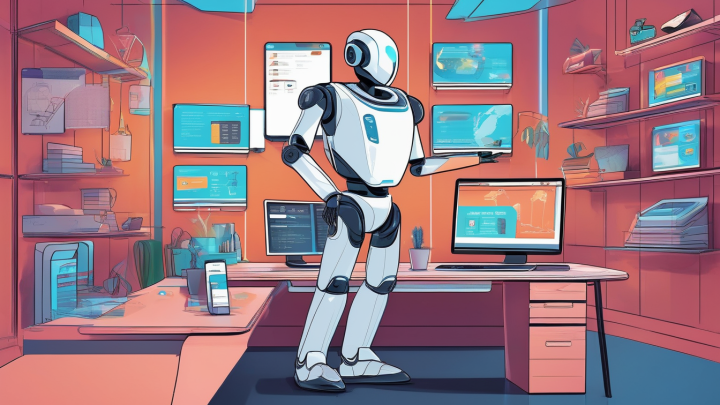In today’s fast-paced digital world, customer service is undergoing a radical transformation, and at the forefront of this revolution is Intercom’s AI assistant, Fin. This innovative tool is not just a fancy gadget; it’s reshaping how businesses interact with their customers. Imagine having a virtual assistant that never sleeps, always ready to respond to inquiries at any hour. That’s the magic of Fin! It’s designed to streamline support processes, making them quicker and more efficient, which is exactly what modern consumers crave.
The adoption of AI in customer service is skyrocketing, and it’s easy to see why. Businesses are recognizing that integrating AI can lead to significant improvements in operational efficiency and customer satisfaction. As more companies turn to AI solutions, they are not just keeping up with the competition; they are setting new standards for customer care. This shift is akin to moving from dial-up internet to high-speed broadband—once you experience the speed and efficiency, there’s no going back!
So, what makes Fin stand out in the crowded marketplace of AI solutions? For starters, it’s designed with the user experience in mind. Fin can handle a myriad of tasks, from providing instant answers to common questions to intelligently directing complex inquiries to the right support agents. This not only saves time but also enhances the overall customer journey. With Fin, businesses can ensure that every interaction is smooth and satisfying, paving the way for loyal customers who feel valued and understood.
Fin is packed with features that make it a powerhouse in customer service:
- Automated Responses: These allow customers to get quick answers to their queries without waiting in long queues.
- Intelligent Routing: This feature ensures that customer inquiries are directed to the most suitable agents, enhancing the chances of a quick resolution.
Imagine being able to answer customer questions before they even finish typing! That’s the beauty of automated responses. They not only speed up interactions but also significantly boost customer satisfaction by providing immediate solutions to common issues.
Intelligent routing is like having a smart traffic system for customer inquiries. It directs questions to the right support agents based on their expertise, ensuring that customers receive the best possible assistance without unnecessary delays.
Implementing AI in customer service brings a treasure trove of benefits:
- Cost Savings: Reducing the need for extensive human resources can lead to significant savings.
- Improved Response Times: Faster response times mean happier customers.
- Enhanced Customer Engagement: AI can help tailor interactions, making customers feel more connected to the brand.
However, the road to AI integration isn’t without bumps. Businesses often face challenges such as data privacy concerns and the need to maintain a human touch in customer interactions. Addressing these issues is crucial for a successful AI implementation.
In an age where data breaches are all too common, ensuring customer data privacy is paramount. Companies must be transparent about how they use AI and the data it collects, fostering trust with their customers.
While AI can handle many tasks, the human element in customer service remains irreplaceable. Strategies to maintain this personal touch, even while leveraging AI, are essential for creating a balanced customer experience.
The future of AI in customer service is bright and full of potential. As technology continues to evolve, we can expect even more sophisticated AI solutions that enhance customer support experiences. The possibilities are endless, and businesses that embrace this change will undoubtedly lead the way in customer satisfaction.

The Rise of AI in Customer Service
AI technology is rapidly transforming the landscape of customer service, and it’s not just a passing trend—it’s a revolution. Imagine walking into a store where a friendly assistant greets you, knows your preferences, and can answer your questions in real-time. That’s the power of AI! Businesses are increasingly adopting AI solutions to enhance customer interactions, streamline operations, and ultimately, boost satisfaction.
As consumers become more tech-savvy, their expectations are evolving. They want instant responses and personalized experiences, and AI is stepping up to the plate. According to recent studies, over 70% of customers prefer interacting with AI for quick inquiries. This shift is not merely about replacing human agents; it’s about augmenting their capabilities. With AI, companies can handle a higher volume of inquiries without sacrificing quality.
Furthermore, the implications of AI adoption are profound:
- Efficiency: AI can manage multiple customer interactions simultaneously, significantly reducing wait times.
- Cost-Effectiveness: Automating routine tasks allows businesses to allocate resources more effectively, saving both time and money.
- Data-Driven Insights: AI systems analyze customer data to provide actionable insights, helping businesses tailor their services.
However, while the rise of AI in customer service presents exciting opportunities, it also raises questions about the future of human jobs in this sector. Will AI take over entirely, or will it create new roles that focus on more complex customer needs? The truth is, a balanced approach is essential. AI can handle repetitive tasks, allowing human agents to focus on providing a more personalized touch.
In conclusion, the rise of AI in customer service is reshaping how businesses engage with their customers. As we move forward, it will be fascinating to see how this technology continues to evolve and integrate into our daily interactions, enhancing customer experiences while maintaining that all-important human connection.

Introducing Intercom’s Fin
In the ever-evolving world of customer service, Intercom’s Fin stands out as a game-changer. This AI assistant is not just another automated tool; it’s designed to transform the way businesses interact with their customers. With its innovative features, Fin enhances support systems by providing quick, efficient, and personalized responses that cater to individual customer needs.
What makes Fin truly remarkable is its ability to understand and process natural language. This means customers can communicate with Fin in a conversational manner, just as they would with a human agent. Imagine having a virtual assistant that can not only answer your questions but also understand the context and emotions behind your inquiries. That’s the magic of Fin!
Among its many features, Fin excels in two key areas:
- Automated Responses: Fin can handle a plethora of common queries without human intervention. This feature ensures that customers receive instant answers, eliminating long wait times and frustration.
- Intelligent Routing: When a question is too complex for Fin to tackle alone, it intelligently routes the inquiry to the right support agent. This ensures that customers are connected with the best-suited representative for their needs.
By leveraging these functionalities, Intercom’s Fin not only improves operational efficiency but also boosts customer satisfaction. Businesses can manage a higher volume of inquiries without compromising the quality of support.
As we delve deeper into the AI landscape, it’s clear that tools like Fin are paving the way for a more responsive and engaging customer service experience. With the right blend of technology and human touch, Intercom’s Fin is setting new standards for support systems everywhere.
Key Features of Fin
Intercom’s Fin is not just another AI assistant; it’s a game-changer in the realm of customer service. With its cutting-edge capabilities, Fin is designed to tackle the everyday challenges faced by support teams, making interactions smoother and more efficient. One of the standout features of Fin is its automated responses, which provide instant answers to frequently asked questions. Imagine a customer reaching out at midnight, and instead of waiting for hours, they receive immediate assistance. This not only saves time but also significantly boosts customer satisfaction.
Moreover, Fin excels in intelligent routing, a feature that ensures inquiries are directed to the right support agents based on specific criteria. This means that if a customer has a technical question, they won’t be stuck talking to a sales representative. Instead, they’re connected with someone who can genuinely help them. This level of precision in handling customer requests can lead to quicker resolutions and happier customers.
To illustrate the power of these features, consider the following table that highlights how Fin compares to traditional customer service methods:
| Feature | Traditional Support | Intercom’s Fin |
|---|---|---|
| Response Time | Hours | Seconds |
| Inquiry Routing | Manual | Automated |
| 24/7 Availability | No | Yes |
In summary, the key features of Fin not only streamline the customer service process but also enhance the overall experience for both customers and support teams. With its ability to provide instant solutions and connect customers with the right experts, Fin is paving the way for a more efficient and satisfying customer support landscape.
Automated Responses
In today’s fast-paced digital world, customers expect immediate answers to their queries. This is where Intercom’s Fin shines with its . Imagine walking into a store where a friendly assistant is always ready to help, no matter the time of day. That’s the power of automation in customer service! Fin can provide quick and accurate responses to common questions, ensuring that customers feel heard and valued without the long wait times.
The magic of automated responses lies in their ability to handle a variety of inquiries efficiently. For instance, if a customer wants to know about business hours, return policies, or product features, Fin can instantly deliver the information. This not only saves time for the customer but also allows human agents to focus on more complex issues that require a personal touch.
Here are some key benefits of using automated responses:
- Speed: Customers receive answers in seconds, improving their overall experience.
- Consistency: Automated responses ensure that every customer gets the same accurate information.
- 24/7 Availability: Customers can get help anytime, even outside of regular business hours.
However, it’s essential to remember that while automation can handle many tasks, it shouldn’t replace human interaction entirely. Customers still appreciate a warm, personal touch, especially when dealing with sensitive issues. Therefore, businesses should aim for a balance, using automated responses for routine inquiries while keeping human agents available for more nuanced conversations.
In conclusion, Intercom’s Fin is revolutionizing customer service with its automated responses. By providing quick answers and freeing up human agents for more complex tasks, Fin enhances the customer experience and allows businesses to operate more efficiently. As we continue to embrace AI technology, the role of automated responses will only grow, making it an indispensable tool in the future of customer support.
Intelligent Routing
Imagine walking into a bustling restaurant, and instead of waiting in line, a friendly host immediately guides you to the perfect table. This is similar to how works in customer service, ensuring that inquiries are directed to the right support agents without delay. Intercom’s Fin utilizes advanced algorithms to analyze customer queries and route them based on specific criteria such as issue type, urgency, and even customer history.
This feature not only enhances the overall customer experience but also boosts the efficiency of support teams. When customers receive timely assistance from the most qualified agent, it leads to quicker resolutions and higher satisfaction rates. For instance, if a customer has a billing question, Fin can automatically direct them to a billing specialist, rather than a general support agent who may not have the necessary expertise.
Furthermore, Intelligent Routing can significantly reduce the workload on support teams by minimizing the time agents spend on irrelevant inquiries. This allows them to focus on more complex issues that require human intervention. The result? A more engaged and productive support staff, capable of providing exceptional service.
To illustrate the impact of Intelligent Routing, consider the following benefits:
- Faster Response Times: Customers get their questions answered more quickly, improving their overall experience.
- Higher First Contact Resolution Rates: Directing inquiries to the right agent increases the likelihood of resolving issues on the first interaction.
- Enhanced Customer Satisfaction: A seamless interaction leads to happier customers and fosters brand loyalty.
In an age where customers expect instant gratification, Intelligent Routing is a game-changer. By ensuring that every inquiry is handled by the most appropriate agent, businesses can not only meet but exceed customer expectations. As we look to the future, the integration of such intelligent systems will undoubtedly become a standard in customer service, paving the way for a more efficient and customer-centric approach.
Benefits of Using AI in Support
When it comes to customer service, the integration of AI is nothing short of a game-changer. Imagine having a tireless assistant that works around the clock, ready to help your customers at any moment. That’s exactly what AI brings to the table! By implementing AI solutions like Intercom’s Fin, businesses can enjoy a multitude of benefits that not only enhance efficiency but also elevate the overall customer experience.
One of the most significant advantages of using AI in support is the cost savings. With automated responses and intelligent routing, companies can reduce the need for a large customer support team. This allows for reallocating resources to other critical areas of the business. Additionally, AI can handle multiple inquiries simultaneously, making it an ideal solution for high-volume periods.
Another noteworthy benefit is the improved response times. Customers today expect quick answers, and AI meets this demand effortlessly. With features like automated responses, customers receive instant replies to common questions, minimizing wait times. This swift interaction not only satisfies customers but also boosts their loyalty towards the brand. In fact, studies show that businesses utilizing AI in customer service can achieve up to a 30% reduction in response times.
Furthermore, AI enhances customer engagement by providing personalized experiences. By analyzing customer data and behavior, AI can tailor responses and suggestions that resonate with individual users. This level of personalization makes customers feel valued and understood, which is crucial in building long-term relationships.
In summary, the benefits of using AI in support systems are vast and impactful. From cost savings and improved response times to enhanced customer engagement, AI is paving the way for a more efficient and satisfying customer service experience. As technology continues to evolve, embracing AI will not only keep businesses competitive but also ensure they meet the ever-changing demands of their customers.

Challenges in AI Implementation
As businesses rush to embrace the power of AI in customer service, they often encounter a variety of challenges that can hinder successful implementation. One of the most pressing issues is data privacy concerns. Customers today are more aware than ever of how their personal information is handled. They want to know that their data is secure and used responsibly. In fact, a recent survey revealed that 70% of consumers are hesitant to interact with AI systems due to fears about data misuse. Businesses must navigate these concerns carefully, ensuring they comply with regulations like GDPR while also building trust with their customers.
Another significant challenge is maintaining the human touch in customer interactions. While AI can handle routine queries efficiently, it often lacks the empathy and understanding that only a human agent can provide. Customers appreciate a personal connection, especially when dealing with complex issues. To address this, companies should consider a hybrid approach, where AI manages simple inquiries, and human agents step in for more intricate problems. This balance can enhance the overall customer experience while still leveraging the benefits of automation.
Moreover, integration with existing systems poses a technical hurdle. Many businesses have legacy systems that may not easily accommodate new AI technologies. This can lead to compatibility issues, resulting in a fragmented customer support experience. To overcome this, organizations need to invest in robust IT infrastructure and possibly seek the guidance of specialists who understand both AI and their current systems.
Finally, there’s the challenge of employee training. Staff need to be equipped with the skills to work alongside AI tools effectively. This means investing time and resources into training programs that help employees understand how to use these technologies to enhance their roles rather than replace them. The goal should be to create a collaborative environment where AI and human agents work together to provide exceptional service.
Data Privacy Concerns
In today’s digital age, data privacy has emerged as a critical concern, especially when it comes to AI in customer service. With platforms like Intercom’s Fin handling sensitive customer information, it’s essential to address how this data is collected, stored, and utilized. Customers are increasingly aware of their rights and the potential risks associated with sharing personal information. This awareness raises the question: how can businesses ensure their customers feel secure while leveraging AI technologies?
One of the main challenges businesses face is building trust with their customers. To tackle this, companies must implement robust data protection measures. Here are some key strategies:
- Transparency: Clearly communicate how customer data will be used and the measures in place to protect it.
- Compliance: Adhere to regulations such as GDPR and CCPA, which set strict guidelines on data handling.
- Data Minimization: Collect only the data necessary for providing services, reducing the risk of breaches.
Moreover, businesses must ensure that their AI systems are designed with privacy in mind. This involves incorporating features that allow customers to control their data, such as opting out of data collection or requesting data deletion. By prioritizing these privacy measures, companies can enhance customer confidence in their AI solutions.
Ultimately, the balance between leveraging AI for efficiency and safeguarding customer privacy is delicate. As more businesses adopt AI technologies, addressing data privacy concerns will be crucial for maintaining customer loyalty and trust. The future of customer service hinges not only on advanced AI capabilities but also on the commitment to protecting customer information. After all, a secure customer is a loyal customer!
Maintaining Human Touch
In a world increasingly dominated by automation and artificial intelligence, the challenge of preserving the human touch in customer service is more critical than ever. Customers crave genuine interactions, and while AI like Intercom’s Fin can handle routine inquiries, it’s essential to ensure that the warmth and empathy of human agents are not lost in the mix. So, how can businesses strike this delicate balance?
One effective strategy is to implement a hybrid model of customer support. This means using AI for initial contact and routine tasks while keeping human agents available for more complex issues. For instance, Fin can quickly address frequently asked questions, leaving human agents free to tackle challenging customer concerns that require a personal touch. This approach not only enhances efficiency but also fosters a more satisfying customer experience.
Another vital aspect is ensuring that customers are aware they can easily connect with a human agent when needed. Businesses can incorporate clear messaging within their AI interfaces, such as:
- “Need more help? Chat with a human!”
- “Our team is just a click away for more complex inquiries.”
Furthermore, training human agents to work alongside AI tools is crucial. By equipping them with the skills to interpret AI-generated data and insights, agents can respond more effectively to customer needs. This collaboration can lead to faster resolutions and a better overall experience.
Lastly, gathering feedback from customers about their interactions with both AI and human agents can provide valuable insights. Understanding customer preferences can help businesses refine their approach, ensuring that the human touch remains a core component of their customer service strategy.
In summary, while AI is transforming customer service, maintaining a human touch is essential for building lasting relationships. By adopting a hybrid model, promoting human interaction, training agents effectively, and seeking customer feedback, businesses can ensure that their support systems remain both efficient and empathetic.

The Future of AI in Customer Support
As we gaze into the crystal ball of customer support, it’s clear that the future of AI holds incredible promise. Imagine a world where customer interactions are seamless, efficient, and tailored to individual needs. With advancements in technology, AI is not just a tool; it’s becoming an integral part of the customer experience landscape.
One of the most exciting trends is the rise of predictive analytics. By analyzing past interactions and customer behavior, AI can anticipate issues before they arise. This proactive approach allows businesses to address concerns swiftly, often before the customer even realizes there’s a problem. It’s like having a personal assistant who knows you so well that they can solve your issues before you even ask!
Moreover, the integration of natural language processing (NLP) is revolutionizing how customers interact with AI. Future AI systems will understand context, emotions, and even nuances in conversation. This means customers will feel more understood and valued, enhancing their overall experience. Imagine chatting with AI that not only answers your questions but also empathizes with your frustrations!
However, with great power comes great responsibility. As AI continues to evolve, businesses must prioritize data security and customer privacy. Trust is paramount in customer relationships, and any breach could have devastating effects. Companies will need to implement robust measures to safeguard personal information while still leveraging AI’s capabilities.
In addition, maintaining the human touch will be crucial. While AI can handle many tasks, there will always be situations that require human empathy and understanding. The future will likely see a hybrid model where AI handles routine inquiries, while human agents step in for complex issues. This balance ensures that customers receive both efficiency and a personal touch.
In conclusion, the future of AI in customer support is not just about automation; it’s about creating a more engaging and personalized experience for customers. As technology continues to advance, the possibilities are endless. Are you ready to embrace this exciting future?
Frequently Asked Questions
- What is Intercom’s Fin?
Intercom’s Fin is an AI-powered assistant designed to enhance customer support by providing automated responses and intelligent routing of inquiries. It helps businesses manage customer interactions more efficiently, ensuring quick and accurate support.
- How does AI improve customer service?
AI improves customer service by streamlining processes, reducing response times, and providing personalized experiences. With tools like Fin, businesses can handle a higher volume of inquiries without sacrificing quality, ultimately leading to greater customer satisfaction.
- What are the key features of Fin?
Fin offers several key features, including automated responses for common questions and intelligent routing that directs inquiries to the right support agents. These functionalities allow for quicker resolutions and a more organized customer service experience.
- What challenges do businesses face when implementing AI?
Businesses may encounter challenges such as data privacy concerns and the need to maintain a human touch in customer interactions. It’s important to address these issues to ensure a smooth integration of AI into existing support systems.
- Will AI replace human customer service agents?
While AI can handle many tasks, it is unlikely to completely replace human agents. The best approach is a hybrid model where AI manages routine inquiries, allowing human agents to focus on more complex issues, thus enhancing the overall customer experience.
- What does the future hold for AI in customer support?
The future of AI in customer support looks bright, with ongoing advancements expected to improve efficiency and personalization. We can anticipate more sophisticated AI tools that further enhance customer interactions and support experiences.



